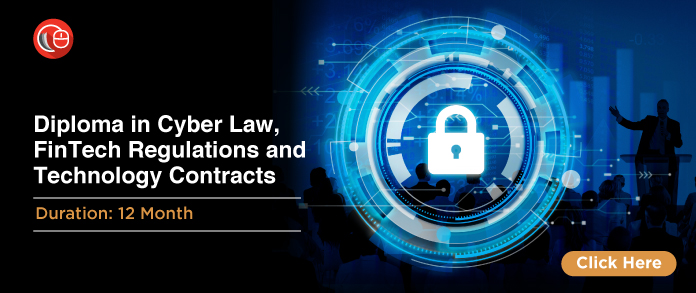This article is written by Aniket Aggarwal, Team LawSikho.
Unless one has slept through the past two decades, it is unlikely to not have come across the term ‘blockchain’. Primarily known for powering cryptocurrencies like Bitcoin and Etherium, the World Economic Forum promises that this new contraption is “pulling us into a new era of openness, decentralisation and global inclusion”.
It features among the most disruptive technologies in the world today, alongside game-changers like Big Data and Artificial Intelligence, with some even hailing it as “the most disruptive invention since the Internet itself.”
Needless to say, it can be appropriated for infinite applications and its use cases are poised to revolutionise industries across the board – from behemoths like real estate and banking to essentials like healthcare and insurance (read this).
The legal industry itself stands at the crossroads of changes brought in by this technology. If you are unable to comprehend why or how, fret not. Today, I will walk you through the kinds of opportunities it engenders for lawyers.
What can blockchain be used for?
Today, most of our market networks are managed by a central authority – such as RBI for currency and banking, and IRDAI for insurance. Implementing blockchain would significantly reduce the need of intervention by such authorities, as transactions on blockchain are immutable and tamper-proof (see this video for a rudimentary understanding of how blockchain functions).
Trust is created not through regulation by a central authority but through acceptance and use by a majority. Thus, blockchain is a “foundational” technology that has the potential to recreate foundations for our social and economic infrastructure (see here for details).
With the covid pandemic disrupting supply and raking up uncertainty in the transactional space, the world is accelerating towards adopting blockchain tech in a more pervasive manner.
It is believed that blockchain can be used in securing supply chains, tracking disease outbreaks, and managing crises (read how here). Blockchains will replace existing systems and networks. Gradually, and then entirely. In one thing, and then, in many.
Three broad areas will be completely shaken up:
- Where there is a need for an immutable and tamper-proof system, such as for credit rating, social security and financial reporting;
- Where there is a need for digitisation of physical assets, such as for representing land, property or money; and
- Where there is a need for automation of processes, such as for property registration and succession, escrow releases, and self-execution of contracts.
Deloitte effectively surmises the various industry-specific blockchain use cases in this publication prepared in association with ASSOCHAM.
What can lawyers do?
Good governance and profit are both reasonably realisable through blockchain. That is the reason why business and even governments are forging ahead to incorporate and implement this new tech into their structures and processes, despite the vacuum of laws and regulation to govern the same.
This does not mean that blockchain and crypto-assets are entirely unregulated. Incumbent laws relating to capital markets, investments, data protection, transfer of property, and contracts continue to apply.
Countries like the USA, Japan and Australia permit corporations to raise funds through ‘initial coin offerings’, which is the cryptocurrency equivalent of an initial public offer (IPO). People who choose to invest receive tokens in exchange, which may simply represent their stake in the company, or may even have utility for the company’s product or service. Navigating the intricacies of laws to which such investment schemes would be subject requires the counsel of well-read lawyers and legal professionals.
The kinds of tasks carried on by lawyers in such ‘blockchain-enabled’ jurisdictions will be expected to be performed by lawyers in India as well. Services that a technology lawyer can offer range from structuring a sale of crypto-assets, drafting of specialised documents (like a Simple Agreement for Future Tokens), reviewing and auditing smart contracts, and consulting on a maze of compliances.
The fact that blockchain is still somewhat nascent presents an incredible opportunity for lawyers. Legal professionals stand to benefit greatly from learning about blockchain in the specific context of their clients’ business areas. Such lawyers would be indispensable in traversing the myriad legal and regulatory webs surrounding the technology and its infinite applications.
In India, young firms like Ikigai Law and Spice Route Legal have oriented themselves towards performing extensively in the technology markets, and are reaping the benefits of a first-mover advantage. Doyens like Cyril Amarchand Mangaldas also seek to avail a similar advantage via the establishment of ‘LegalTech’ incubators to drive innovation in the legal industry.
While the opportunities mentioned above exist today, entirely novel niches are poised to be created with the growing pervasion of blockchain.
According to Legal Alignment – a team of lawyers working towards breaking down silos between tech, law, and academia – lawyers and firms can be expected to grow into completely modernised profiles, such as:
Smart Contract Firms
Creating smart contracts would require a multidisciplinary team, consisting (at least) of the following:
- Lawyers, to provide the legal knowledge behind contract structures, terms and enforcement;
- Developers, to provide the engineering behind the translation of legal constructions into self-executing structures using blockchain tech; and
- Coders and programmers, to perform the actual work of coding “terms” of the contract conceived by the collaboration of lawyers and developers.
Such a firm represents not just a new practice model but also a new business model. While a single lawyer may be able to master all aspects of smart contract development, a multidisciplinary team with requisite skills appears to be a more practical approach.
Lawyers with blockchain understanding can also act as Smart Contract Mediators to help parties navigate the process. Knowledge of distributed ledger technology is critical to perform this task.
While the smart contract firm described above may participate in this niche, a smart contract mediator’s role would be focused on resolving disputes and general legal management of the transaction during execution, rather than the front-end drafting work.
Blockchain will flatten the opportunities and open the market up to agile individual lawyers and smaller firms to carve out portions of the market.
Smart Title Company
One area that has a large scope in this regard is real estate, where establishing an accurate and uninterrupted chain of title is critical to the transaction. Since blockchain creates a P2P ledger accessible to all, the intermediary role typically performed by a title search lawyer would disappear.
The need for traditional due diligence would stand obviated, as all deeds, documents and funds would be stored in self-executing blocks.
The role of public notaries would be redundant as well, with property data on the blockchain being automatically verified and time-stamped by the chain itself. Accordingly, a significant amount of required time and cost is likely to disappear from real estate transactions. Read here how this can work.
Building and running a blockchain-based real estate transaction platform would be cost-effective, transparent, and nearly frictionless.
Blockchain Policy Advisor
Blockchain can offer new applications in whichever existing business areas you serve, and this has the potential to change the applicability of law, policy and regulation in those areas.
With the hype of blockchain translating into tangible applications, lawmakers, policy enthusiasts and regulators are in the early stages of understanding the changes that blockchain may engender. Despite initial misgivings, RBI has enabled a framework for a regulatory sandbox for the same.
For these reasons, understanding blockchain and the changes it can bring right now can contribute greatly towards transforming yourself into the go-to blockchain law and policy advisor in your practice area.
The age of blockchain threatens the traditional role of a lawyer and simultaneously offers entirely new practice opportunities – but only for those who are savvy enough to familiarise themselves with blockchain technology.
Maybe you want to stay ahead of the curve as well – after all, the only question is whether you want to future-proof your career or not.
If so, have a look at our course on Cyber Law, FinTech Regulations and Technology Contracts, where we show you how the blockchain revolution fits into our existing regimes, and what you can do to usher in this new era.
Stay safe and keep learning.
LawSikho has created a telegram group for exchanging legal knowledge, referrals and various opportunities. You can click on this link and join:
 Serato DJ Crack 2025Serato DJ PRO Crack
Serato DJ Crack 2025Serato DJ PRO Crack











 Allow notifications
Allow notifications


